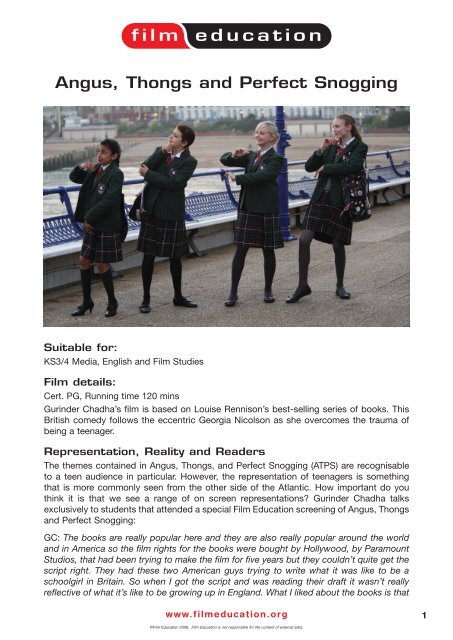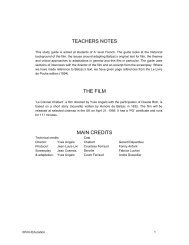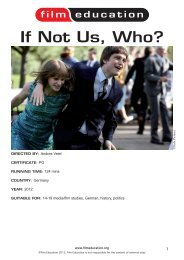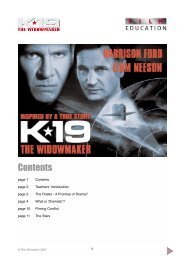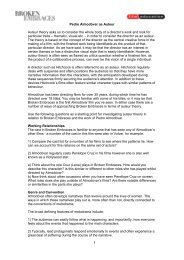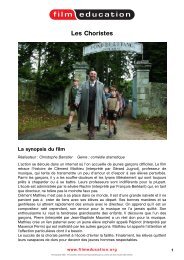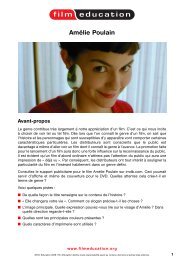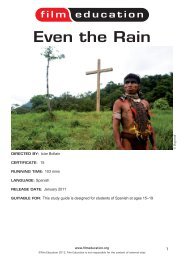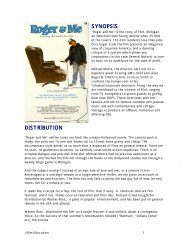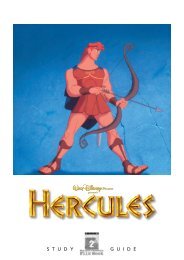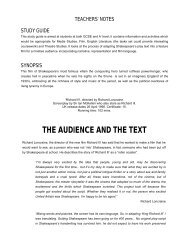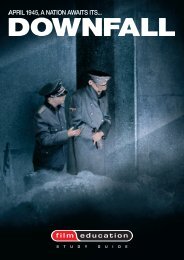Angus, Thongs and Perfect Snogging study guide - Film Education
Angus, Thongs and Perfect Snogging study guide - Film Education
Angus, Thongs and Perfect Snogging study guide - Film Education
Create successful ePaper yourself
Turn your PDF publications into a flip-book with our unique Google optimized e-Paper software.
<strong>Angus</strong>, <strong>Thongs</strong> <strong>and</strong> <strong>Perfect</strong> <strong>Snogging</strong><br />
Suitable for:<br />
KS3/4 Media, English <strong>and</strong> <strong>Film</strong> Studies<br />
<strong>Film</strong> details:<br />
Cert. PG, Running time 120 mins<br />
Gurinder Chadha’s film is based on Louise Rennison’s best-selling series of books. This<br />
British comedy follows the eccentric Georgia Nicolson as she overcomes the trauma of<br />
being a teenager.<br />
Representation, Reality <strong>and</strong> Readers<br />
The themes contained in <strong>Angus</strong>, <strong>Thongs</strong>, <strong>and</strong> <strong>Perfect</strong> <strong>Snogging</strong> (ATPS) are recognisable<br />
to a teen audience in particular. However, the representation of teenagers is something<br />
that is more commonly seen from the other side of the Atlantic. How important do you<br />
think it is that we see a range of on screen representations? Gurinder Chadha talks<br />
exclusively to students that attended a special <strong>Film</strong> <strong>Education</strong> screening of <strong>Angus</strong>, <strong>Thongs</strong><br />
<strong>and</strong> <strong>Perfect</strong> <strong>Snogging</strong>:<br />
GC: The books are really popular here <strong>and</strong> they are also really popular around the world<br />
<strong>and</strong> in America so the film rights for the books were bought by Hollywood, by Paramount<br />
Studios, that had been trying to make the film for five years but they couldn’t quite get the<br />
script right. They had these two American guys trying to write what it was like to be a<br />
schoolgirl in Britain. So when I got the script <strong>and</strong> was reading their draft it wasn’t really<br />
reflective of what it’s like to be growing up in Engl<strong>and</strong>. What I liked about the books is that<br />
www.filmeducation.org<br />
©<strong>Film</strong> <strong>Education</strong> 2008. <strong>Film</strong> <strong>Education</strong> is not responsible for the content of external sites.<br />
1
they reminded me of being at school because I grew up in London <strong>and</strong> went to school in<br />
Ealing. And, I thought it was a great opportunity to make a film like the Americans make all<br />
the time about high-school shenanigans, films like Clueless, Mean Girls etc. And, I thought<br />
it was a great opportunity to make a British version of a high-school movie for the rest of<br />
the world.<br />
We tested this film in Los Angeles <strong>and</strong> initially the studios weren’t sure how the film would play<br />
in America because they thought it might be too English but actually it was fantastic <strong>and</strong> it was<br />
a very similar reaction to what we saw today with you. The girls in LA absolutely loved it <strong>and</strong><br />
they really loved the idea of seeing English girls <strong>and</strong> boys going through exactly what they go<br />
through in California. I’m very proud that it’s a British version of the kind of film Americans<br />
usually make <strong>and</strong> in terms of the title, if you know the books, <strong>Angus</strong>, <strong>Thongs</strong> <strong>and</strong> Full-frontal<br />
<strong>Snogging</strong>, you’d know that was a jokey title. But if you don’t know the books, <strong>and</strong> a lot of<br />
adults don’t, some people actually thought we were making a porno film because it has thongs<br />
<strong>and</strong> full-frontal in the title <strong>and</strong> the combination of the two sounds like something very rude. To<br />
calm it down a bit we decided to go for <strong>Perfect</strong> <strong>Snogging</strong> instead of Full-frontal <strong>Snogging</strong> but<br />
I like that because the message of the whole film is that you’re perfect as you are, you don’t<br />
need to get a nose job or dye your hair, just be yourself.<br />
This quote raises many questions about representation. Firstly, in terms of making a British<br />
version of a genre that’s more often made in America. From watching the trailer <strong>and</strong> or the<br />
whole film what aspects would you identify as particularly British?<br />
Gurinder Chadha talks about the stages that the script went through before it eventually<br />
got made. She says the script ‘...wasn’t really reflective of what it’s like to be growing up<br />
in Engl<strong>and</strong>.’<br />
Do you think this is as important for British audiences? What stereotypes might an<br />
American or international audience rely on to underst<strong>and</strong> British life? Think about other<br />
British films that have had international success. Are there any common representations<br />
or stereotypes that these draw on? Do you feel that these are representative of life in<br />
Britain as you experience it?<br />
Consider the issues raised by the testing in LA. It is important to consider the production<br />
context <strong>and</strong> how this impacts on the final content of the film.<br />
Q: You said you wanted to make the film more multi-cultural but I never saw any black,<br />
Asian or Chinese people in the film except for Ellen.<br />
GC: Do you know why? It’s because it was set in Eastbourne, there aren’t many black<br />
people in Eastbourne is there? But the school is full of all kinds of different kids from<br />
different backgrounds. It’s an important point though because for those of you who have<br />
read the books, you’ll know that there aren’t any Indian or black friends in it but I wanted<br />
to make one of them Indian or black but in the end I went for Manjeevan because she was<br />
a good actress <strong>and</strong> just by casting her there was a huge uproar on the internet. People<br />
said, no you can’t do that because in the books, no one is Indian but as a director I wanted<br />
to produce something a bit more culturally mixed. There was a huge debate about it but I<br />
stuck to my guns <strong>and</strong> in the end I cast her <strong>and</strong> I think a lot of people who were protective<br />
of the books, didn’t really like that. We shot the actual school that Georgia goes to in<br />
Hillingdon so that’s got more of a London feel I think <strong>and</strong> I made sure I shot it because<br />
culturally that was quite mixed.<br />
www.filmeducation.org<br />
©<strong>Film</strong> <strong>Education</strong> 2008. <strong>Film</strong> <strong>Education</strong> is not responsible for the content of external sites.<br />
2
This quotation demonstrates a number of issues about the complexity of representation.<br />
Consider the following questions <strong>and</strong> statements for discussion:<br />
■ A film is always a work of deliberate construction. Do you think a filmmaker has a<br />
responsibility to present diversity even if its not based on fact?<br />
■ When adapting a book to the screen you should always be as faithful as possible.<br />
■ A film needs to be internationally successful in order to be commercially viable. So from<br />
this point of view appealing to the widest possible audience with multi–cultural characters<br />
is essential.<br />
■ <strong>Film</strong>making is not just about commercial success, <strong>and</strong> by including multi-cultural<br />
characters purely for these reasons is tokenistic.<br />
Representations of Gender<br />
Q: Some of your films like Bahji on the Beach have domestic violence <strong>and</strong> quite serious<br />
themes. Was it a bit odd with this film to concentrate more on what an average teenager<br />
was like, without the darker, more morbid side?<br />
GC: It was a different film. That’s a good question actually. This is a different film but on<br />
the other h<strong>and</strong>, I do think that this film is making serious points but it does it jokingly, like<br />
when Georgia turns up with Vaseline on her eyelashes, or she’s doing the pencil test, it’s<br />
making serious points about the fact that girls are always being told they’re too fat or too<br />
thin, or they’re not curvy enough, or their hair is too straight <strong>and</strong> with all the magazines,<br />
there’s constant bombardment of having to look like a particular type of perfect model.<br />
And, one of the reasons I cast Georgia in this movie is because she is not Hollywood, she<br />
www.filmeducation.org<br />
©<strong>Film</strong> <strong>Education</strong> 2008. <strong>Film</strong> <strong>Education</strong> is not responsible for the content of external sites.<br />
3
looks like a regular, average, normal young English girl <strong>and</strong> I think in some of the scenes<br />
she looks really, really pretty <strong>and</strong> in other scenes she looks really plain <strong>and</strong> average <strong>and</strong> that<br />
in itself is quite an important political statement.<br />
Questions for discussion<br />
■ What do you think Gurinda Chadha means by ‘...she is not Hollywood’? If you were<br />
casting this film, is this something that would be important to you?<br />
■ The pressures on girls <strong>and</strong> women to look a certain way are raised here <strong>and</strong> throughout<br />
the film. Do you agree with Chadha that ‘…in other scenes she looks really plain <strong>and</strong><br />
average <strong>and</strong> that in itself is quite an important political statement.’?<br />
■ Do you think there is a climate of expectation for film to push a political agenda through<br />
their work, <strong>and</strong> should this also apply to films targeted at younger audiences?<br />
Further Scenes For Discussion<br />
Generically the romantic comedy requires that the central couple don’t get together<br />
immediately. Georgia has many sequences where she is trying to get noticed. Think about<br />
the scene where we find the two characters in the swimming pool. How is comedy<br />
generated here?<br />
Georgia undergoes many scenes of embarrassment in her journey to become desirable. In<br />
the sequence with her sister <strong>and</strong> the shaved off eyebrow, how would you explain the<br />
audience’s pleasure in this sequence?<br />
For the full interview with Gurinder Chadha please go to the British Cinema page.<br />
www.filmeducation.org<br />
©<strong>Film</strong> <strong>Education</strong> 2008. <strong>Film</strong> <strong>Education</strong> is not responsible for the content of external sites.<br />
4


